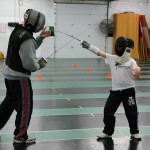
The Referee.
As a competitive fencer, you will at some point disagree with the calls the referee makes. As a young competitor, I often found myself infuriated with referees who were not making the correct calls (or at least what I thought should’ve been the correct calls). It can be difficult, training hard for weeks on end, finally arriving to your competition, and then feeling like the referee was at fault for missing your obvious attack in prep. It’s easy to take a loss very personally and place blame on the referee, but it’s not a tactic that will help you improve. Like it or not, working with the referee is a part of competition. It’s important to quickly figure out how you can make a call you disagree with turn into a tool you can learn from. Here are some simple things to remember the next time to disagree with a referees call.
#1. Don’t Argue. It’s amazing to me how many fencers (and coaches) I see become confrontational with a referee over a call. This is possibly the worst thing you can do. Experienced referees are not afraid of defending their call, and are prepared to pull out their penalty cards if someone is disturbing order, or delaying the bout. More than that, remember that the referee is human, and while referees train themselves to be unbiased, having someone in your face and arguing doesn’t help you focus on the job.
Arguing over a call also takes your focus as a competitor away from where you want it. Instead of a confrontation, very politely ask your ref to explain the call (remember, the referee is not required to explain, but most will), and if you have an idea of what the referee is seeing (such as a hesitation or preparation of the arm), bring that up. It shows the referee you understand what’s happening. (Be careful not to ask the referee about the call too often, if the referee is consistent, you should know how to adjust. See item #3).
#2. Understand the Referee’s Perspective. While on strip, you have a completely different viewpoint from where the referee is standing. From your en garde position, it looks like your opponent is 100% in preparation, from the referee’s perspective, your attempted attack in prep looks 100% like a counter-attack. It’s important to realize that the image of the action you planned out in your head and what happened in real life can be very different.
This is where it is helpful to look to your coach. Your coach has the ability to understand what action you are attempting and has a perspective closer to the referees. This is where it’s important to put trust both in your coach and in the referee. Remember that referees are often experienced fencers and coaches as well, and just like you have trained to compete, referees have studied and practiced to be where they are.
#3. You Are Biased. No matter how calm and collected you are on strip, you are still biased. You want to win each point. So keep the emotional element in mind when you disagree with the call. The referee, while human, has trained to be non-biased and apply the rules of fencing. This is why clubmates, teammates, coaches, and relatives of fencers are not allowed to referee each other. What you can do is put your confidence into your fencing. If a referee is making a close call between a fencer who looks hesitant and a fencer who looks confident, the confident fencer will almost always win.
#4. Let It Go and Change. To a certain extent, there is only so much you can do if you come across a referee who makes calls you don’t like. However, one of the best ways to handle calls you dislike is to change what you are doing. If you are fencing and realize your opponent can always parry a particular target, would you continue attacking to the same target? Of course not! You adapt and do a feint disengage. It’s the same thing when it comes to calls. If the referee is not calling a particular action your way, get away from that action. Don’t try to prove to the referee that it’s your attack in prep or your beat when it’s being called the same way 3 times in a row. The referee is not likely to change his or her mind mid-bout. Change up your action to something that works!
One more thing to remember: if you have questions as to why a referee was calling things a certain way, take time after your competition to find your referee (when he or she is available), thank them for refereeing, introduce yourself, and ask about those specific calls you didn’t understand. There are many referees who are happy to explain what they see and talk about how the rules are applied.



